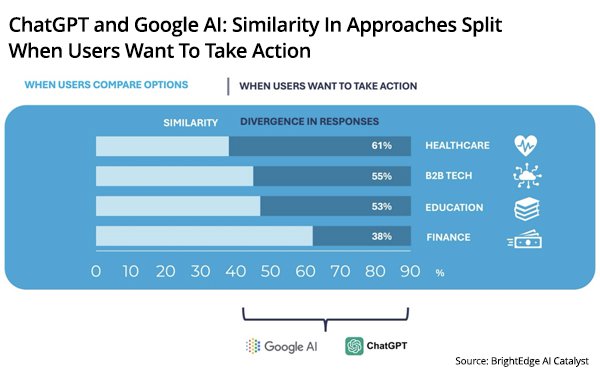
The implications for marketers are staggering as
AI-driven search transforms the ways users find and use online information. Experts are monitoring these shifts to assess the effects on engagement.
In a detailed comparison of OpenAI ChatGPT
and Google AI across industries, BrightEdge analysis of billions of data points makes it clear that at least for now, marketers will need to optimize websites and content for two types of search
behavior.
"AI search has fundamentally split into two philosophies—Google as your research assistant versus ChatGPT as your trusted coach,” said Jim Yu, BrightEdge CEO. “The
difference is unmistakable. When users ask, 'what should I do next?' ChatGPT suggests tools, and Google gives them more to read.”
OpenAI ChatGPT and Google AI have evolved into
fundamentally different tools, with ChatGPT acting like a "trusted coach" for decision-making while Google remains a "research assistant" for information gathering.
advertisement
advertisement
Google seems to act more as
a research assistant, while ChatGPT acts like a trusted coach for decision making. That difference shapes the type of tool users choose for different needs, according to BrightEdge.
Healthcare
demonstrates the highest divergence with 62%. When prompts refer to symptoms or medical information, OpenAI ChatGPT and Google AI mention the CDC and The Mayo Clinic. When prompted to help with things
like "How to find a doctor," ChatGPT pushes users toward Zocdoc, while Google points to hospital directories.
B2B technology follows close behind with 47% divergence. When comparing technology
such as cloud platforms, both suggest Amazon Web Services (AWS) and Microsoft Azure. When asked "How to deploy things, such as specific apps," ChatGPT relies on tools like Kubernetes and the AWS CLI,
while Google offers tutorials and Stack Overflow.
The education sector demonstrates consistent patterns, with 45% divergence. When comparing "Best online learning platforms," both platforms
surface Coursera, EdX, and LinkedIn Learning. When a user’s prompt pertains to learning a skill such as "How to learn Python," ChatGPT recommends Udemy, whereas Google directs users to
user-generated content hubs like GitHub and Medium.
Finance shows the least divergence, but BrightEdge still considers it significant. Even at 39%, finance maintains the same type of pattern.
When comparing "Best credit cards," both suggest major institutions like Chase, Wells Fargo, and Citi. When asked for "How to create a budget," ChatGPT pushes to apps like Mint and YNAB, while Google
drives users to NerdWallet and blog articles.
A Pew Research Study published Tuesday showed an interesting twist on similar search data. Google searches that contain more words, ask questions
or use full sentences tend to produce AI summaries more often.
Longer searches are more likely to produce an AI summary. Just 8% of one- or two-word searches resulted in an AI summary,
but that share rose to 53% for searches with 10 words or more.
Other types of searches that tend to result in AI summaries include searches that form questions. Some 60% of search queries that
began with question words such as “who,” “what,” “when” or “why” resulted in an AI summary.
Searches that use full sentences, showing
that 36% of searches include both a noun and a verb generated an AI summary.
The challenge for publishers, users encountering an AI summary are less likely to click on links to other
websites, compared with users who do not see one.
The study is based on data from 900 U.S. adults who shared their browsing data with Pew. Based on the study's findings, when an AI
overview -- AIO -- appeared in search, users were less likely to click on links when compared to queries that didn't generate AI summaries.
In fact, Google users who encountered an AI
summary clicked on a traditional result link in 8% of all visits, suggesting publishers may need another approach. Those who did not encounter an AI summary clicked on a search result nearly
twice as often, about 15% of visits.
In fact, google users are more likely to end their browsing session after visiting a search page with an AI summary than on pages without a
summary. This happened on 26% of pages with an AI summary, compared with 16% of pages with only traditional search results, according to Pew.
Regardless of whether a page had an
AI-generated summary or not, the largest share of Google searches in Pew’s study resulted in the user either browsing elsewhere on Google or leaving the site entirely without clicking a link in
the search results. Around two-thirds of all searches resulted in one of these actions.